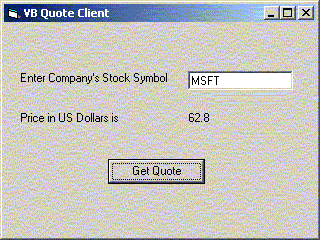Classic COM to
.NET Interoperability
Building a Classic COM
Client using Visual Basic ver 6.0
| Note |
| To
work with any of these samples, you will need the
following: .........................................Microsoft .NET SDK .........................................Microsoft Visual Studio.NET Beta 2 or higher .........................................Microsoft Visual Basic ver 6.0 |
Create a simple VB 6.0 Standard EXE project type and set a reference to the new generated QuoteServer type library. Before you add any code, save the entire project.
1. Create a GUI Front-end
A single button will be used to manipulate the .NET Type.

2. Develop the VB6ClientForm.frm Form
| VB6ClientForm.frm | ||
|
|
|
Classic COM to .NET Interoperability |
|
|
Developing a Classic COM Server Component using C# and .NET - The QuoteServer Example |
|
|
Developing a Classic COM Client Application using Visual Basic ver 6.0 to access the QuoteServer - The VB6Client Example |
|
|
Developing a Managed C++ Client Application which binds to the Server using Early Binding - The QuoteClient Example |
|
|
Developing a Managed C++ Client Application which binds to the Server using Late Binding - The cppLateBinding Example |
Download the entire source code as a zip file.
click here to go
to
My
Advanced C#/.NET Tutorial Page...
| About the Author... |
| Gopalan Suresh Raj is a Software Architect, Developer and an active Author. He has co-authored a number of books including "Professional JMS", "Enterprise Java Computing-Applications and Architecture" and "The Awesome Power of JavaBeans". His expertise spans enterprise component architectures and distributed object computing. Visit him at his Web Cornucopia© site (https://gsraj.tripod.com/) or mail him at gopalan@gmx.net. |
This site was developed and is maintained by Gopalan Suresh Raj This page has been visited
|
||
Last Updated : Dec 27, '01 |
||
Copyright (c) 1997-2001, Gopalan Suresh Raj - All rights reserved. Terms of use. |
All products and companies mentioned at this site are trademarks of their respective owners. |